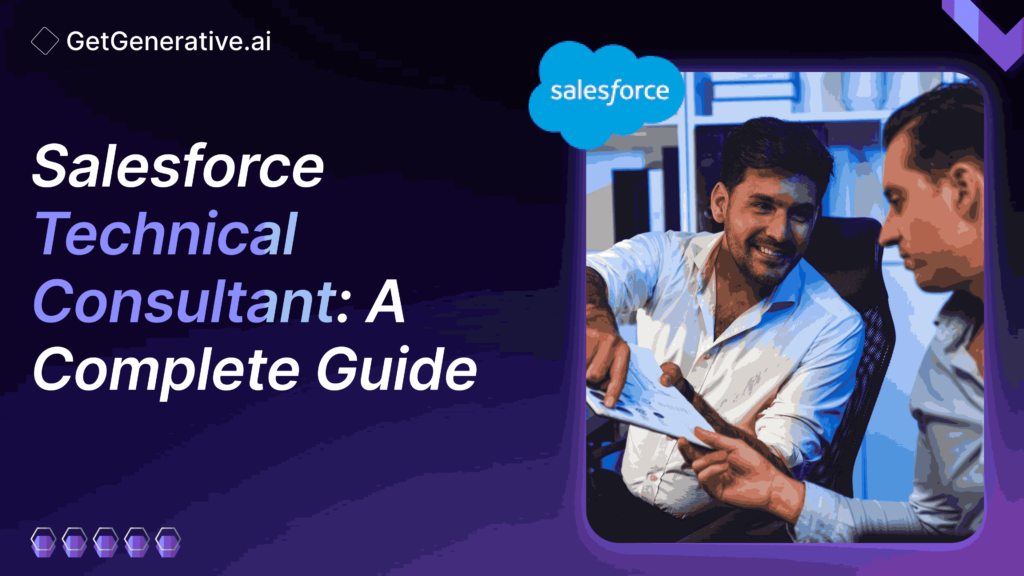Salesforce Technical Consultant: A Complete Guide 2024
Salesforce has emerged as a leading customer relationship management (CRM) platform, transforming how businesses interact with customers.
Amidst this transformation, the role of a Salesforce Technical Consultant has gained significant prominence. If you’re considering a career as a Salesforce Technical Consultant, this guide will provide you with everything you need.
What is a Salesforce Technical Consultant?
A Salesforce Technical Consultant is a professional who specializes in the technical aspects of Salesforce implementation and customization. They work closely with businesses to understand their needs, design solutions, and ensure the Salesforce platform is effectively integrated into their operations.
How to Become a Salesforce Technical Consultant?
Becoming a Salesforce Technical Consultant typically involves a combination of education, experience, and certification. Here’s a step-by-step guide:
- Education: A bachelor’s degree in computer science, information technology, or a related field is often preferred.
- Experience: Gaining hands-on experience with Salesforce through internships, projects, or entry-level positions is crucial.
- Certification: Obtaining Salesforce certifications, such as Salesforce Certified Technical Architect or Platform Developer, can significantly boost your credibility.
Roles and Responsibilities of a Salesforce Technical Consultant
The roles and responsibilities of a Salesforce Technical Consultant can vary, but typically include:
- Analyzing business requirements and translating them into technical specifications.
- Designing and implementing customized Salesforce solutions.
- Integrating Salesforce with other systems.
- Conducting data migration and ensuring data integrity.
- Providing technical support and troubleshooting.
- Training end-users on Salesforce functionalities.
Best Practices for Salesforce Technical Consultants
To excel as a Salesforce Technical Consultant, follow these best practices:
- Stay Updated: Salesforce regularly updates its platform. Stay informed about the latest features and best practices.
- Effective Communication: Communicate technical concepts to non-technical stakeholders.
- Customization and Configuration: Balance customization with configuration to ensure scalability and maintainability.
- Documentation: Maintain comprehensive documentation for all implementations and customizations.
- Continuous Learning: Engage in continuous learning and professional development to stay in the field.
Also Read – Salesforce CPQ Consultant: A Complete Guide
Advanced Skills for Salesforce Technical Consultants
Beyond foundational knowledge, Salesforce Technical Consultants should acquire advanced skills to excel in their roles. These skills not only enhance their technical capabilities but also enable them to provide more value to their clients and organizations. Here’s a detailed look at the advanced skills necessary for a Salesforce Technical Consultant:
Apex and Visualforce
Apex: Apex is Salesforce’s proprietary programming language, similar to Java. Mastery of Apex is crucial for developing custom business logic and complex functionalities that cannot be achieved through standard configuration alone. Specific skills include:
- Writing Apex triggers to automate tasks and enforce complex business processes.
- Creating custom Apex classes and methods to encapsulate business logic.
- Using SOQL (Salesforce Object Query Language) and SOSL (Salesforce Object Search Language) for efficient data retrieval.
Visualforce: Visualforce is a markup language that creates custom user interfaces in Salesforce. Advanced skills include:
- Designing custom Visualforce pages to provide unique user experiences.
- Implementing Visualforce controllers to handle page logic.
- Integrating Visualforce with standard and custom Salesforce objects.
Lightning Framework
The Lightning Component Framework is essential for building modern, dynamic web applications on the Salesforce platform. Key skills include:
- Lightning Web Components (LWC): Developing reusable and efficient web components using standard JavaScript and HTML.
- Aura Components: Although LWC is preferred, understanding Aura Components is still valuable for maintaining and upgrading legacy components.
- Lightning App Builder: Using the builder to create custom applications with Lightning components, integrating them seamlessly with the Salesforce ecosystem.
Integration
Integrating Salesforce with other systems is a critical capability. This involves:
- APIs: Proficiency in REST and SOAP APIs for data exchange between Salesforce and external systems.
- Middleware: Knowledge of middleware platforms like MuleSoft, Dell Boomi, or Informatica for complex integrations.
- OAuth and Single Sign-On (SSO): Implementing secure authentication mechanisms to streamline user access across multiple systems.
Data Management
Effective data management ensures that Salesforce operates smoothly and provides accurate insights. Important skills include:
- Data Migration: Expertise in tools like Data Loader, Salesforce Data Import Wizard, and third-party ETL (Extract, Transform, Load) tools to migrate data efficiently and accurately.
- Data Quality: Implementing data quality practices, such as data validation rules, duplicate management, and regular data cleansing.
- Data Governance: Establishing frameworks to maintain data integrity, security, and compliance with regulations like GDPR and CCPA.
Problem-Solving
Advanced problem-solving skills are essential for addressing complex technical challenges. This includes:
- Root Cause Analysis: Identifying and diagnosing the root causes of system issues or performance bottlenecks.
- Performance Tuning: Optimizing Salesforce performance through efficient coding practices, query optimization, and proper use of indexes.
- Troubleshooting: Using tools like Salesforce Debug Logs, Event Monitoring, and Health Check to diagnose and resolve issues promptly.
Project Management and Collaboration
While technical expertise is vital, managing projects and collaborating effectively is equally important. Key skills include:
- Agile Methodologies: Applying Agile principles to manage Salesforce projects, ensuring iterative development and continuous feedback.
- Stakeholder Communication: Communicating effectively with stakeholders to gather requirements, provide updates, and manage expectations.
- Team Collaboration: Working collaboratively with cross-functional teams, including business analysts, developers, and end-users to deliver successful projects.
Security and Compliance
Ensuring the security and compliance of Salesforce implementations is critical, particularly for industries with stringent regulatory requirements. Advanced skills include:
- Security Configuration: Implementing robust security measures, such as field-level security, role hierarchies, and sharing rules.
- Compliance: Ensuring Salesforce implementations comply with industry-specific regulations, conducting regular security audits, and implementing data encryption where necessary.
- Identity Management: Configuring and managing Salesforce identity features, such as Multi-Factor Authentication (MFA), Single Sign-On (SSO), and identity verification.
Business Acumen
Understanding the business context in which Salesforce operates allows technical consultants to provide more strategic value. This involves:
- Industry Knowledge: Gaining insights into specific industries, such as finance, healthcare, or retail, to tailor Salesforce solutions to industry-specific needs.
- Business Process Optimization: Identifying opportunities to streamline and automate business processes using Salesforce, enhancing operational efficiency and effectiveness.
Also Read – Salesforce Data Cloud Consultant: The Role and Importance
Career Path for Salesforce Technical Consultants
The career path for a Salesforce Technical Consultant can be quite rewarding, with opportunities for advancement into roles such as:
- Senior Salesforce Consultant
- Salesforce Technical Architect
- Salesforce Project Manager
- Director of Salesforce Solutions
- VP of CRM Solutions
What are the Common Challenges Faced by Salesforce Technical Consultants?
Like any career, being a Salesforce Technical Consultant comes with its challenges:
- Complex Implementations: Managing complex Salesforce implementations can be challenging and require meticulous planning.
- Change Management: Ensuring user adoption and managing resistance to change.
- Data Security: Maintaining data security and compliance with regulations.
- Continuous Learning: Keeping up with the frequent updates and new features of the Salesforce platform.
Is a Certification Necessary to Become a Salesforce Technical Consultant?
While it’s possible to become a Salesforce Technical Consultant without certification, having certifications can significantly enhance your job prospects and credibility. Certifications demonstrate your expertise and commitment to the field, making you a more attractive candidate to employers.
Do Salesforce Technical Consultants Need Coding Skills?
Yes, coding skills are essential for Salesforce Technical Consultants. Proficiency in Apex, Visualforce, and Lightning Components is often required to design and implement customized solutions. However, combining coding and declarative (clicks, not code) solutions is also valuable.
Related Read – Becoming a Salesforce Consultant – The Ultimate Guide
Conclusion
A career as a Salesforce Technical Consultant is both challenging and rewarding. You can excel in this dynamic field with the right combination of education, experience, and certification. Whether you’re just starting or looking to advance your career, the role of a Salesforce Technical Consultant offers numerous opportunities for growth and development.
Enhance your Salesforce consulting with GetGenerative.ai. Effortlessly craft outstanding proposals, enabling you to dedicate more time to providing exceptional client service.
Start today!
Frequently Asked Questions (FAQs)
1. What is the primary role of a Salesforce Technical Consultant?
A Salesforce Technical Consultant specializes in the technical implementation and customization of the Salesforce platform to meet business needs.
2. How long does it take to become a Salesforce Technical Consultant?
It can take several years, including obtaining a degree, gaining experience, and achieving certification.
3. Are there different types of Salesforce certifications?
Yes, Salesforce offers various certifications for different roles and expertise levels, including Technical Architect, Developer, and Administrator.
4. What industries hire Salesforce Technical Consultants?
Salesforce Technical Consultants are in demand across various industries, including finance, healthcare, retail, and technology.
5. Can you work remotely as a Salesforce Technical Consultant?
Many Salesforce Technical Consultants work remotely, providing flexibility and opportunities to work with clients globally.




